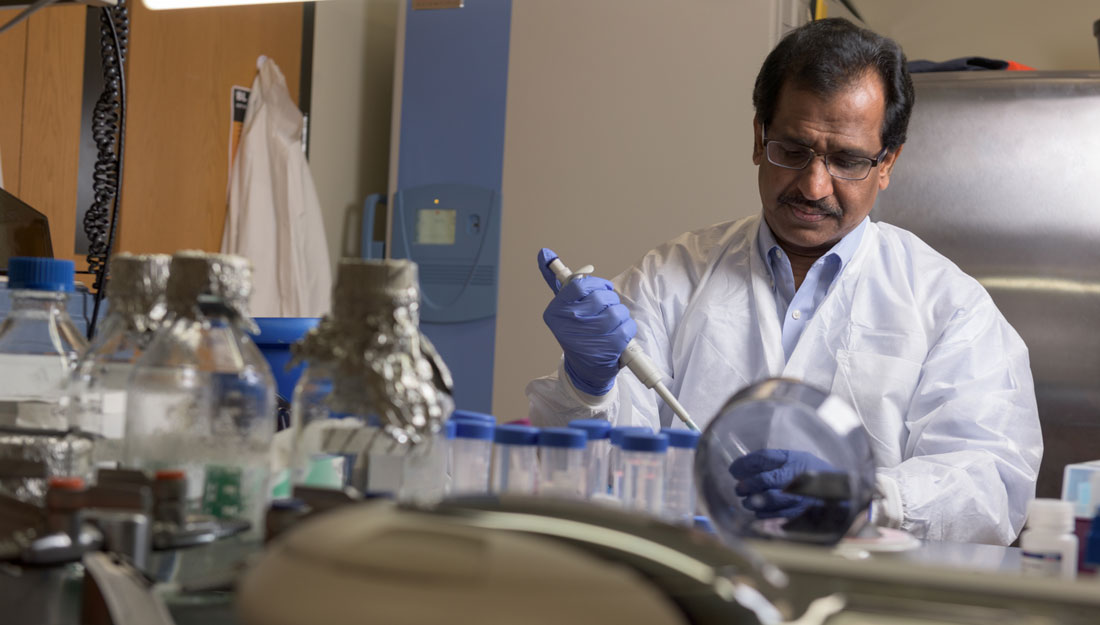Women in Medicine: Renee Ridley

At Texas A&M, we celebrate the American Medical Association’s Women in Medicine Month this September by highlighting a few of our extraordinary female researchers, scientists, physicians and students who are making meaningful contributions to medicine every day on our campuses and across the globe.
Renee Ridley, a third-year medical student at the Texas A&M College of Medicine, is one of these remarkable women. To help mark Women in Medicine Month, she answers some questions about the profession and her life.
Q: Why do you aspire to be a woman in medicine?
A: It is no secret that the medical profession has been male dominated for most of its history. This was the predominant thought that I was born into in 1963 in rural Kentucky. I grew up in a traditional home, where my father was the “bread-winner” and my mother was the best stay-at-home mom ever. I was the youngest of three daughters and always seemed to march to the beat of my own drum. I was always interested in disease processes and how the body was made. I was even fortunate enough to take an anatomy class during high school.
To my recollection, there was never a discussion about college prep or career planning while I was in high school. The ACT exam was something I knew I had to take to get into college, but I was never really told the importance of it. When I got close to graduation from high school, I knew that since one of my older sisters went to Murray State University (the local university 15 miles from our home), that I would be expected to follow suit. It was kind of rare for people to move out of the area and attend college in another city, so I did not even ask. When it came time to put down a major upon registration as an undergraduate, I went over to talk to someone in the pre-med department. I was later told by my father that pre-med was off the table. He wasn’t willing to pay for my college tuition if I wanted to get a biology/pre-med degree. But, I recall him saying he would support me going to nursing school. As an 18-year-old naïve female from Hardin, Kentucky, it never dawned on me that I had a choice at this point. I knew nothing about financial aid and had no clue how to be independent at this point in my life. So, my desire to be a woman in medicine started a very long time ago. However, I would never have dreamed that I would have the opportunity to make that aspiration a reality in my 50s. I saw many trajectories of medical care while I practiced nursing from 1985 to 2015—thirty wonderful years. My desire to know more, do more, and be an advocate for patients at the highest level never left me while I practiced as a nurse. I wanted to be that woman in medicine that I did not grow up knowing.
Thinking out of the box was something I was good at, and I hoped this characteristic would lead me to this role, no matter how impossible the dream seemed.
Q: What obstacles have you faced on your path to medicine?
A: The most telling obstacle was my gender. My mother never worked outside the home, and the opportunity to attend college was considered a privilege, as I was in the first generation to complete a college degree in my family. Women at that time were encouraged to be teachers, nurses, secretaries, waitresses and anything that seemed to fit the role of employment as a woman. My paternal grandmother was employed as a cook, my maternal grandmother a seamstress—traditional female roles. Moving forward in life, I later became a wife, nurse, and mother (in that order)—again, traditional female roles. Once in the mode of fulfilling all those roles at once, going back to school became difficult. I was supported to get additional nursing degrees, but would have never been supported to move and start medical school. As a result, I completed my BS degree in nursing in 1985, my MS degree in nursing in 1996 and my PhD in nursing in 2008. That desire to know more, do more, and be an advocate for the patient was doable with the advanced degrees. However, none of this fulfilled my desire to become a physician. Attending college to get my nursing degrees was possible because I was always able to work and go to school at the same time, a necessity as a wife and mother at the end of the 20th century. As my children became adults, I started to see the path to medicine as a challenge, but quite possibly a journey that I could undertake.
Q: Why did you choose Texas A&M?
A: Texas A&M holds a special place in my heart. After living in Kentucky for 45 years, my husband and I decided to relocate to Texas. We had lived close to our families all this time, and we finally felt confident enough to venture out and see what the rest of the world was like. This was in 2008, after I had finished my PhD. I was employed as a professor of nursing in Kentucky and looked at all the possibilities for tenure-track positions in other states. Both of our kids were in college, so that played a role in our decision to come to Texas. I took a position at Texas A&M in Corpus Christi in the College of Nursing & Health Sciences, partly because of its location on the ocean, but mostly because I loved the faculty and program. One of the perks of coming to Texas was that there was a state law that nursing professors could get free tuition for their children if they were attending college at the same place where the nursing professor was employed. This plan saved us lots of money. While atTexas A&M in Corpus Christi, my son got this wild idea that I should take courses alongside him and our daughter. I got to take organic chemistry, physics and biochemistry with my kids! It was the most memorable part of this long journey. Both my kids graduated fromTexas A&M in Corpus Christi in 2012, and then moved to College Station (daughter) and Louisville (son). We had no other family in Corpus Christi when they moved, so my husband and I decided to move to College Station to be close to our daughter and her husband. After the relocation, I worked as a professor in the College of Nursing at the Texas A&M Health Science Center. One month after starting employment there, I had a meeting with the dean of admissions at the Texas A&M College of Medicine. He encouraged me to apply to medical school there. The conversation with him was uplifting and reinforced my belief that I was doing the right thing. God had brought me on this journey, and Texas A&M seemed to be the common denominator in this blessing!
Q: How are you advocating for women’s health issues?
A: My journey as a women’s health advocate began in 1985 as a registered nurse when I was cross trained to work in labor and delivery, postpartum, women’s surgical,and newborn nursery. My goal for every woman’s delivery was to make it safe and special to her, something she would never forget. Looking back over the years, seeing healthy babies grow into productive adults is very rewarding. After advancing my nursing degree in 1996, I served women as a Family Nurse Practitioner, working primarily with women in a busy primary care clinic and helping to open and staff, Angels Community Clinic, the first free clinic in Calloway County. Shortly thereafter, I became a professor of nursing in various universities, teaching maternal-newborn nursing and women’s health courses at the BSN level. Teaching students to advocate for women was the indirect route, but certainly helped advance many of the issues that were pertinent over the course of my time in that role. As a professor, I published a variety of articles in well-known nursing journals on topics pertinent to the care of pregnant women (such as fetal malposition, labor induction and vaginal birth after C-section, or VBAC). My goal as a medical professional is to become an OB-GYN, educating women and their families on the safest way to deliver and raise their newborns, contributing to improvements in maternal/neonatal rates of morbidity and mortality in the United States. I am interested in the centering pregnancy antepartum model of care and will perhaps look for a residency program that will teach me how to implement this in practice.
Q: Are there any women in medicine, past or present, who inspired or influenced you to pursue a career in the field?
A: The very first female physician that I met and worked with was Dr. Joyce Hughes, a pediatrician in Murray, Kentucky. We called her Dr. Joyce—a practice rarely seen with male physicians. Dr. Joyce taught me a great deal about neonatal care and served as my own pediatrician for our two children. Her abilities to assert herself as a physician in a male-dominant field were amazing to me. I saw her as an intelligent female physician who could still be a wife and mother and—yes—be feminine!
Q: What hurdles do we need to overcome for women in medicine?
A: Thankfully, the doors for women in medicine have been opened for many years now. The hurdles that still need to be overcome, however, are the stereotypes that still prevail. For example, what specialty a woman chooses to go into should be based on her interests and talents, and not the traditional role she would most likely match into. I’m not advocating that all women need to be surgeons, but when the mix of physicians is more evenly dispersed, then I will say that the hurdles are being torn down. Women in medicine have special needs and interests, one of which includes having a career and a family. We carry, deliver, raise and nurture children, if that is what we choose to do. It is not, however, all that we do. Women in medicine carry the responsibility of representing a gender that has not always been treated fairly. We are clearly in the 21st century. Female voices are valuable and necessary for positive health outcomes moving forward.
Q: Based on your own experiences, what advice would you give young girls who want to pursue a career in medicine?
A: It is essential that young females interested in pursuing a career in medicine know what they would be getting into. One of the best ways to do this is through job shadowing with a female physician. Thankfully, educational systems of today are equipped to guide students to choose careers that match with their interests. Although doing this in person is gold standard, the ability to explore options could easily be done in a virtual world, thanks to technology. Advocating for females to excel in STEM programs is far advanced compared to when I was a young female. I am thankful for this, but do not consider myself an expert in that area. I would refer young girls interested in medicine to collaborate with their parents and school counselors/academic advisors.
Q: What is your personal motto?
A: As a future woman in medicine, the greatest quality I will fight to keep is my integrity. Therefore, my motto is this: I am not perfect, but I am perfectly honest. I ascribe to be myself and am proud of the woman I have become. I will use my experiences as a woman in the roles of wife, mother, nurse and physician (future) to promote the welfare of the women and children that I will be privileged to serve.
Media contact: media@tamu.edu


